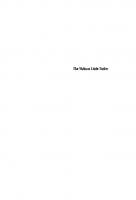The Heathen: A Novel 9781501757761
Narcyza Zmichowska (1819–76) was the most accomplished female writer to come out of Poland in the mid-nineteenth century
144 61 18MB
English Pages 264 [214] Year 2012
Recommend Papers

- Author / Uploaded
- Narcyza Zmichowska
- Ursula Phillips
File loading please wait...
Citation preview
~HEATHEN
g'kHEATHEN ~~---
Narcyza Zmichowska TRANSLATED BY URSULA PHILLIPS
N I U P R E S S I DeKalb, IL
© 2012 by Northern Illinois University Press
Published by the Northern Illinois University Press, DeKalb, Illinois 60115 All Rights Reserved Design by Shaun Allshouse Library of Congress Cataloging-in-Publication Data Zmichowska, Narcyza, 1819-1876. [Poganka. English] The heathen I Narcyza Zmichowska ; translated by Ursula Phillips. p.cm. Includes bibliographical references. ISBN 978-0-87580-684-6 (pbk : acid-free paper) - ISBN 978-1-60909-0692 (e-book) I. Women-Poland-Fiction. I. Phillips, Ursula. II. Title.
PG7158.Z58P613 2012 891.8'536-dc23 2012034095
Contents ~~
Acknowledgments- vii Introduction-ix
The Heathen-3 Notes-157
Acknowledgments ~~ I am pleased that Narcyza Zmichowska's The Heathen, a remarkable text of Polish Romanticism by a woman, is now available to the English-speaking and wider international audience. I am indebted to Alex Schwartz and Mark Heineke ofthe Northern Illinois University Press for agreeing to publish it. I would also like to express my gratitude to David Goldfarb for his support for this and other translation projects, as well as to the M.B. Grabowski Fund and the late Ryszard Gabrielczyk for the grant given to support work on the translation. The preparation of this edition was enhanced by the advice received from Grazyna Borkowska, who recently completed a new annotated Polish edition, who reviewed my introduction and also identified the eighteenth-century Latin volume about the kings and queens of Poland mentioned in the text. I am likewise grateful to Dorota Holowiak for her assistance regarding obscure vocabulary and other linguistic difficulties; to Theodore Zeldin and Olive Duncan who read through earlier versions in their entirety and provided useful feedback; and to other colleagues who also gave advice on specific points including Antonia Lloyd-Jones, Knut Andreas Grimstad, Urszula Chowaniec and Klara Naszkowska.
Introduction
Narcyza Zmichowska (1819-1876) was born in Warsaw in the Congress Kingdom of Poland on 4 March 1819. The Congress Kingdom was a political entity created within the Russian partition following the Congress ofVienna in 1815 and based on the territory of the former Napoleonic Duchy ofWarsaw. Throughout Zmichowska 's lifetime Poland remained partitioned between the empires of Russia, Prussia and Austria ( 1795-1918). She was a Russian subject. She was born in the same year as Queen Victoria and British novelist George Eliot ( 1819-1880) and the same year in which a very different Polish writer Klementyna Tanska ( 1798-1845), whom Zmichowska would later take to task in a vigorous polemic ( 1876), made her debut with the influential but conservative guide to female education, Keepsake Left by a Good Mother (Pamiqtka po Dobrej Malee). Zmichowska is remembered mainly as a teacher and governess, and in some quarters as an early emancipationist and feminist. She is also the author of several novels, of which The Heathen (Poganka, 1846) was the first. She began her literary career as a poet. One of her best-known early poems, published in the Warsaw journal Primrose (Pierwiosnek)-which had already published poetry and short stories by several women including Zmichowska's untitled debut poem in 1839-was The Poets Happiness (Szczfscie poety, 1841). The Poets Happiness has been compared by, among others, critic and biographer Marian St









